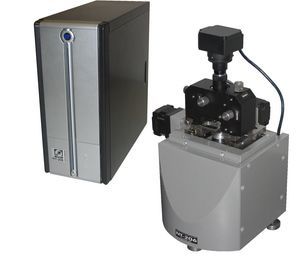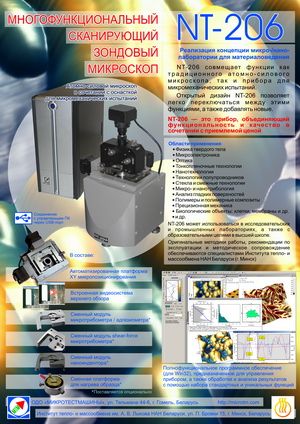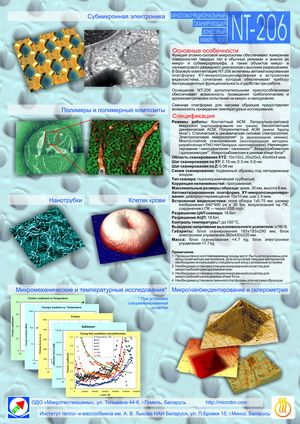Main Sector of relevance\IRC classification 8. Industrial Manufacturing, Material and Transport Technologies
8.16 Multifunctional scanning probe microscope (SPM) NT-206



Developers’ contact information
1) State Scientific Institution “The A.V.Lykov Institute of Heat and Mass Transfer of National Academy of Sciences of Belarus”
15 P.Brovka Street, Minsk BY-220072
Tel.: +375 (17) 284-10-60, fax +375 (17) 292-25-13
Summary
Multifunctional scanning probe microscope (SPM) NT-206 is an atomic-force microscope complete with hardware and software required for nanometric resolution measuring and analysis of micro- and nano surface textures, micro and nano size range objects as well as their micromechanical and other properties.
Description
Multifunctional scanning probe microscope NT-206 consists of a
measurement module and electronic control unit.
The measurement module includes a base platform and a sensing head mounted on
it. It makes measurements on a moving sample (maximum probe sizes: Ø30 mm,
height – 8 mm) under a stationary probe unit.
The base platform is intended for sensing head mounting as well as for sample
positioning and scanning. It includes a tubular piezoscanner to control
XYZ-movement of the tested sample. It also contains an automatic forward/return
motion system.
The XY-positioning platform ensures automatic XY-plane movement of the sensing
head relative to the object table within 10х10 mm space (pitch is up to 2.5
μm, visual checking – up to 10 μm). Manual positioning is also
possible..
The sensing head with its laser-beam probe console deviation detection scheme
supports all operating modes (static and dynamic). It is intended for use with
atomic-force probe units (Si, SiN) on 3,6x1,4x0,6 mm chips mounted in a
removable holder.
A built-in video system facilitates probe monitoring and setting activities
when a sample is positioned and viewed. The video system viewing field
dimensions are 1x0,75 mm, visualization window dimensions – 640x480 pt, image
frequency amounts to 30 images/s.
Depending on specific research tasks, the SPM NT-206 can be supplied with
application-specific removable modules to carry out microtribometric and
adhesive measurements as well as nano indentation.
It is possible to use the SPM in research and industrial laboratories and
introduce it into the higher educational establishments training activities.
Surface images in atomic-force microscopes are obtained by means of sample
horizontal plane scanning with edge curve radius of 2-20 nanometers and probe
fixed on the sensing console. Control system monitors probe position relative
to the sample surface at each measuring point and keeps the probe-sample
distance as specified. Vertical probe position variations at each measuring
point form an atomic-force microscopy (AFM) data matrix incorporating a surface
profile and a surface properties map. The AFM data matrix is written into a
file and is further used for processing, visualization and analysis of
measurement results.
Technology type
Technical advantages and economic benefits
NT-206 allows the following research modes:
Technology differentiation and uniqueness
A new technology.
Context in which technology was identified
It is introduced and implemented in several dozens of educational, research and production establishments both in the Republic of Belarus and near and far abroad.
Technological keywords
Nanotechnologies, atomic force microscopy, nano diagnostics, scanning probe microscopy, cytomechanics, material science, adhesion, rheology, nanotribology, nano composites, thin films, biological cells, microelectronics.
Development Stage
Intellectual property rights
Range of applications
Solid state physics, microelectronics, theory of light, thin-film technologies, nanotechnologies, semiconductor technologies, superhard materials, glass and related technologies, micro- and nanotribology, surface refinement, polymer and polymer-based composites, high-precision mechanics systems, magnetic recording, vacuum engineering, nano structure visualization, biological objects analysis (for membranes, cells, and etc).
Classifier Used at the EU Innovation Relay Centres
Preferable Regions
Practical experience
The technology has been introduced and is implemented.
Environmental impact
None.
Type of collaboration sought
Terms and restrictions
—
Available technical assistance